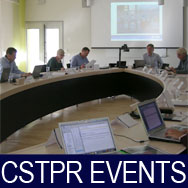Announcements
Max Boykoff Speaking at the Essen Conference on the Cultural Dimensions of Climate Change and the Environment in North America
June 12, 2012
On June 29, Max Boykoff will be speaking at the Essen Conference on the Cultural Dimensions of Climate Change and the Environment in North America. The title of his talk is "Who speaks for the climate? Making sense of media reporting on climate change (in the context of the US Presidential Election)".
Who speaks for the climate? Making sense of media reporting on climate change (in the context of the US Presidential Election) by Max Boykoff
Mass media serve vital roles in communication processes between science, policy and the public, and often stitch together perceptions, intentions, considerations, and actions regarding climate change. Many dynamic, contested and complex factors contribute to how media outlets portray various facets of climate change science, politics and policy. In this talk, I will touch on salient and swirling contextual factors as well as competing journalistic pressures and norms that contribute to how issues, events and information have often become climate ‘news’. For the purposes of the workshop theme regarding ‘cultural dimensions of climate change and the environment in North America’, I will focus my attention on how particular problems and snags in the web of interaction between science, media, policy and the public have contributed to critical misperceptions, misleading debates, distractions and divergent understandings – that are detrimental to efforts that seek to enlarge rather than constrict the spectrum of possibility for responses to climate challenges in the United States (US). To make this more concrete, at part of this discussion I will discuss some factors and features that shape media treatment of climate stances taken up by US Presidential candidates in the run up to the Fall 2012 elections. Overall, I will situate issues like these in the wider context of a ‘cultural politics of climate change’, where formal climate science and governance link with people’s everyday activities in the public sphere.


